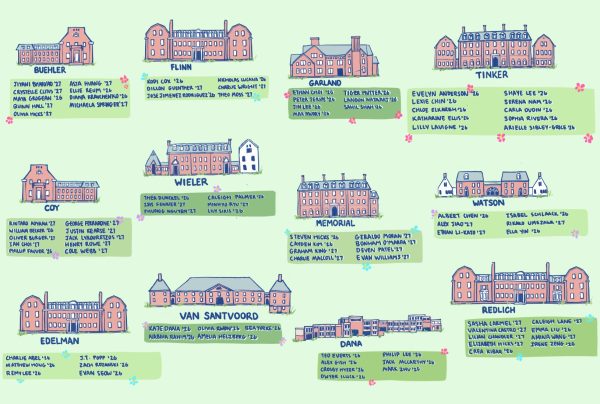What Can You Get “DC’d” for?
Mr. Steve McKibben is currently the dean of community life and an instructor in English. Outside the classroom, Mr. McKibben serves on the Disciplinary Committee as the tie-breaking vote. This year, he has been highly involved in the creation of the Honor Code and other changes to community life.
What are the top five offenses that have most commonly led to DC hearings within the last few years?
I would say the number one issue that we see before us is some variation of academic dishonesty: plagiarism and cheating. Plagiarism by far results in the greatest number of cases.
Beyond that, I really think it is some variation of dishonesty [that] involves misrepresenting the truth. For instance, [this is seen] in someone taking something that doesn’t belong to them… and when an instance or a violation occurs, [someone] lies about it to a class dean, to an adult, [or] to an advisor, and sustaining [the behavior]. Then it is really just a hodgepodge after that: Authorized Use Policy violations (things that have to do with the standards of use with community website and Internet access), interdorming violations, [and] automobile use (getting into an automobile with someone who is underage or [with whom] you do not have permission [to drive]).
Do you think these violations are committed mostly intentionally or accidentally?
Intentionally. It is almost always the result of feeling pressured to complete an assignment on time and not having the time to do that and some poor decisions about what [students] choose to represent as their own work [that result in a DC].
As you see these trends, do you have any advice for the community on how to lessen the frequency of these instances?
[Lessening the frequency of these instances] is one of the reasons I am very interested in pursuing an Honor Code. I think the idea of foregrounding the conversation of what it means to have integrity, what it means to be honest, [and] what it means to be respectful, is really important. I think that we [often] say these words, but we don’t really understand what they mean. We don’t internalize that, so I think that is one of the reasons why last Friday I introduced the concept and [why] I’d love to pursue the creation of the Honor Code.
In terms of the time crunch [on assignments], that is essentially one of the skills that Hotchkiss students learn over the course of their careers here. [They learn] how to balance or how to allocate the finite resource of time. There is only so much time; people allocate it in ways that make sense to them. Sometimes they stay up late gaming or going out with their friends and don’t do their work. Sometimes they spend all their time working on chemistry and not enough on English, constitutional law, or whatever it is that they’re taking. That is a skill that is kind of developmental [and a skill]that students [will] learn how to navigate.
What do you hope students will learn from the DC process?
I think some of the most transformative educational conversations I’ve had have been with students who have faced the DC. I think it is a sobering process to sit across from a committee of your peers, of students… that you have elected to sit in judgment, and the faculty [who] have [been] elected to sit in judgment. At that moment, I think the number one thing that people learn is how to take responsibility for their actions and to do so candidly and with integrity.
What are some of the rules that students are typically not aware that they could be “DC’d” for breaking?
First of all, ignorance is not an excuse. Here’s one: possession or use of fraudulent personal identification, or a fake ID. That is a violation of a major school offense.
One that comes up over and over is automobile policy. You cannot accept a ride from someone who is under 25 [without] permission from the parents. Part of that is liability, part of that is insurance, part of that is safety.
I think [students] should take the time to read, in particular, the Almanac, pages 41 through 44, and they should familiarize themselves with that. Here’s the scoop: we live in this community governed by certain policies and procedures. If I were living in a community, I would want to know what the bounds are, what the bounds of my behavior can be.
Disrespect, trespassing, fire – these are all major school rules, and my guess is most people don’t know that, and most people don’t break them, either. I want to go back to something I said to new students at the beginning of the year: “I think we could do with fewer rules at Hotchkiss.” If we have an Honor Code, if the general rules are what I said to the new students – the two keys to community are to practice gratitude and to not be a jerk – I bet that…if we respect integrity and honesty, we could really nurture a healthy community. Having certain values is more important than having certain rules.




